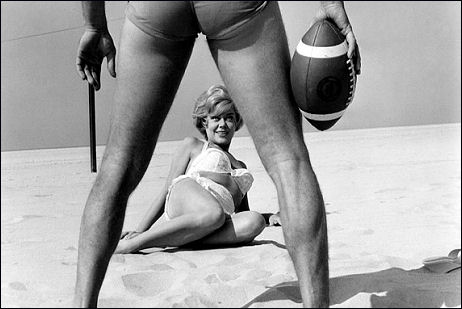From 10.23 through 11.9, BAMcinematek is running a series of 1962 films. It’s partially about celebrating the 75th Anniversary of the New York Film Critics Circle, and also about making up for the fact that the NYFCC didn’t present awards that year due to a newspaper strike. NYFCC chairman Armond White, the apparent architect of the series, has written that 1962 “was equal to Hollywood’s fabled 1939 [so] we welcome this great opportunity to learn and revise film history.”

Glynis Johns in George Cukor’s The Chapman Report.
The films being shown are, for the most part, excellent choices — Jacques Demy‘s Lola, John Ford‘s The Man Who Shot Liberty Valance, David Lean‘s Lawrence of Arabia, Sam Peckinpah‘s Ride The High Country, Robert Aldrich‘s Whatever Happened to Baby Jane?, George Cukor‘s The Chapman Report, Jerry Lewis‘s The Errand Boy (actually released in the fall of 1961), Howard Hawks‘ Hatari, Francois Truffaut‘s Shoot The Piano Player, Francois Truffaut‘s Jules and Jim, Agnes Varda‘s Cleo From 5 to 7, and Michelangelo Antonioni‘s Il Grido (which opened in Italy in mid ’57 but not in the States until ’62).
But if White and BAM are seriously trying to pay tribute to 1962 (which was an exceptional year) and they’re including mid-level pablum like The Chapman Report, why did they blow off Otto Preminger‘s Advise and Consent, Peter Ustinov‘s Billy Budd (an excellent film), John Frankenheimer‘s Birdman of Alcatraz, The Manchurian Candidate and All Fall Down, J. Lee Thompson‘s Cape Fear, George Seaton‘s The Counterfeit Traitor, Frank Perry‘s David and Lisa, Blake Edwards‘ Days of Wine and Roses, Pietro Germi‘s Divorce, Italian Style, Terence Young‘s Dr. No, John Huston‘s Freud, Don Siegel‘s Hell Is For Heroes, John Schlesinger‘s A Kind of Loving, Roman Polanski‘s Knife in the Water (actually released in the U.S. in ’63), Alain Resnais‘ Last Year at Marienbad, Michelangelo Antonioni‘s L’eclisse Stanley Kubrick‘s Lolita, the great Kirk Douglas western Lonely are the Brave, Sidney Lumet‘s version of Eugene O’Neil’s Long Day’s Journey into Night, the internationally-directed The Longest Day, Samuel Fuller‘s Merrill’s Marauders, Arthur Penn‘s The Miracle Worker, Lewis Milestone‘s Mutiny on the Bounty, Jules Dassin‘s Phaedra, George Roy Hilll‘s Period of Adjustment, Ralph Nelson and Rod Serling‘s Requiem for a Heavyweight, Serge Bourguignon‘s Sundays and Cybele (a.k.a., Les dimanches de ville d’Avray), Richard Brooks‘ Sweet Bird of Youth, Robert Mulligan‘s To Kill a Mockingbird, Orson Welles‘ The Trial, Robert Wise‘s Two for the Seesaw, Vincente Minnelli‘s Two Weeks in Another Town, Denis Sanders‘ War Hunt (which costarred Robert Redford and Sydney Pollack) and Philip Leacock‘s The War Lover?
That’s 36 or 37 films released in ’62 — ranging from fairly decent to good to excellent, no pikers in the lot — vs. a mere twelve showing at the BAM/NYFCC series. So the program is showing roughly 25% of the worthy films that opened in the U.S. that year. They couldn’t even manage half! A faux tribute, at best.












